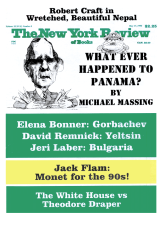Charlie Bourgeois once said of Sarah Vaughan that she made the rest of the singers sound like they were in rehearsal. We ought not to take this pronouncement of Charlie’s as his final or even his fixed judgment; he would never, upon reflection, have thus dismissed every singer but one, since he was too sensible not to be grateful for them all.
He was merely speaking for the nights when Sarah Vaughan blew all reason out of the head to leave nothing in its place save awe, and when she did indeed seem to have swept the board. Now suddenly she is dead, and the mystery of her secular epiphanies remains to tease us.
Three peaks sit most vividly below the Everest of Bessie Smith in our memory. They are Billie Holiday, Ella Fitzgerald, and Sarah Vaughan. Comparisons between heights are a waste of time; none of them was better than the other two, but only different.
Billie Holiday’s was a genius of the autobiographical sort. We feel her most directly in the lyrics she herself wrote in the flush of an experience both immediate and intimate. She is less memorable with someone else’s songs than she is in “God Bless the Child” or “Don’t Explain.” Ella Fitzgerald’s case is different; she is at home with the lyrics of Lorenz Hart and Ira Gershwin as Billie Holiday never quite was.
But Sarah Vaughan could be no less at home with them than Ella Fitzgerald is; what separated her was the insistence upon escaping their walls which went on striking the willful and mischievous note of the little girl about to run away, even when she was well along in her sixties.
She and Ella Fitzgerald had, after all, gone to different schools. Ella Fitzgerald started with Chick Webb’s orchestra in the Thirties, when swing was young and a training ground for the disciplines of the splendid gospel that sufficient unto the song is the melody thereof.
But Sarah Vaughan’s initiation was with the Billy Eckstine band and Dizzy Gillespie and Charlie Parker, for whom swing was old. They were her elder brothers messing around with the chords and breaking the mold and, for the rest of her life, she would be the restlessly unguarded little sister of the avant-garde.
We could, I think, measure the size of her achievement best if we think of her as one of those artists it is a mistake to understand too quickly. There is the matter of a voice in itself extraordinary enough to make it for once plausible to think that a singer of popular songs could have been a grand diva if she had chanced onto a higher road. The voice was a great blessing and a small curse, because it ran changes so far outside the range of her appointed score that I remember a critic far better than myself saying that he’d given up on her because she was an opera singer with little to do with jazz.
In her late years, the complaints grew that she had swelled into forms too mannered. Yet manner has much to do with art: there haven’t been many singers more mannered than Billie Holiday. Even so, I myself, however faithful to the last, imagined a slight falling off and began turning to the Sarah Vaughan of the Fifties, who had armed herself against the temptations of adventure and showed more of the respect for the composer’s conscious intentions that makes Ella Fitzgerald so reliable a comfort.
Then she died and I tried to think of some coherent way to pay her the homage my love owed her, and I listened to all the tapes of hers I had, ending with “How Long Has This Been Going On?” which was her last, and which hadn’t much struck me at the time. And then she gave me her greatest gift, which was the discovery that I had stopped listening too soon.
The intimations of death must already have been upon her that day in 1988 when she was at last free once more to break up the furniture as recklessly as she and the boppers had done forty-five years before. She was scouring the standard ballads for those intentions so buried in the composer that he hadn’t known he had them.
First, she had swung “Body and Soul,” and then pushed it beyond swing, and then returned it to meditations upon the melody, and then doubled the time again until we would never need to wonder any longer what Coleman Hawkins had seen in this beautiful, if a shade overblown, song when he made out of it the unforgettable jazz statement that he did. She did “How Long Has This Been Going On?” as a fast blues, just as the boppers used to, and now we understood what she had been doing when our attention was lapsing a bit.
Advertisement
She was near her end, and she had drawn herself up and gone back to the years when she and Parker and Gillespie were young and bop was new and, to hell with the charts, our own company and our own road are all we want. She and Dizzy had outlived all the others, and now she was going too, and she knew that being young had been the best of good times. Her final revelation has been a return to her apprenticeship, a filling of herself with its spirit and the leaving behind of this last and very best of herself, chiseled and engraved with all she had since learned as journeyman and master.
This Issue
May 17, 1990



